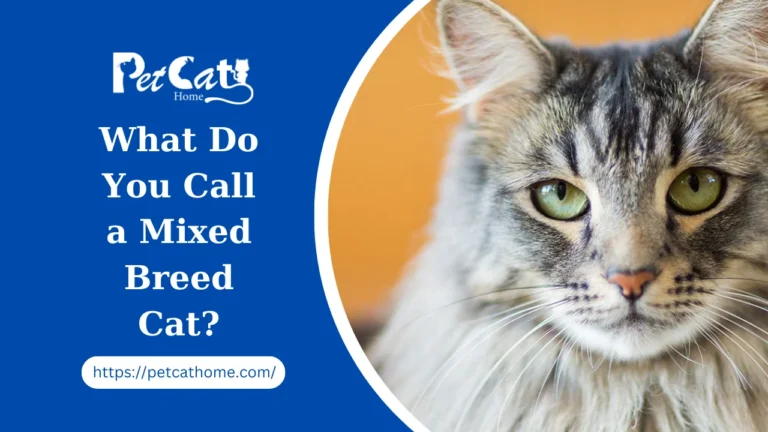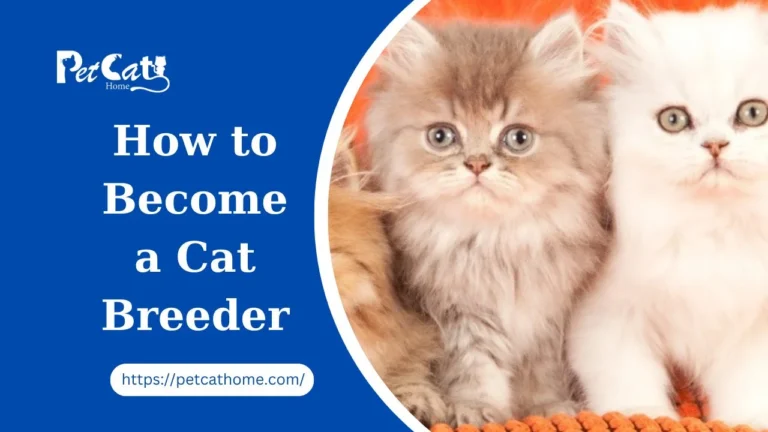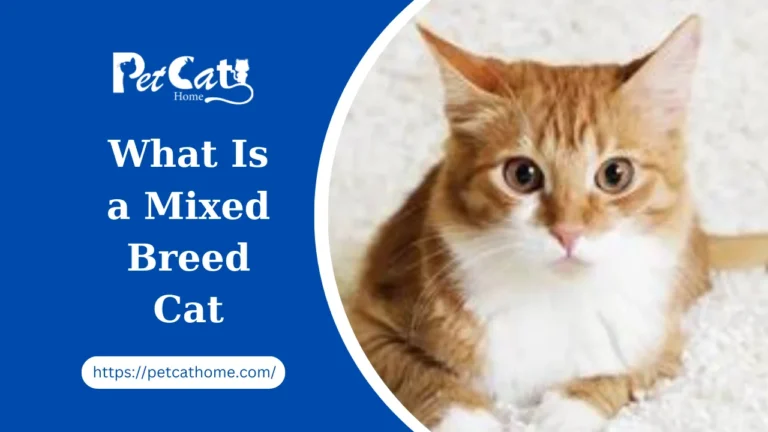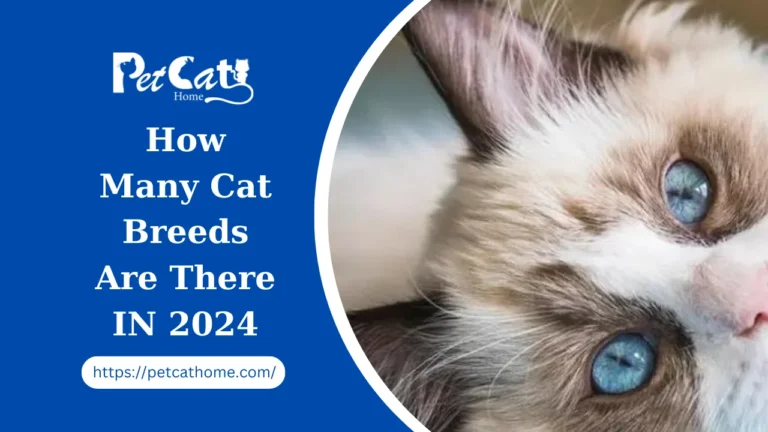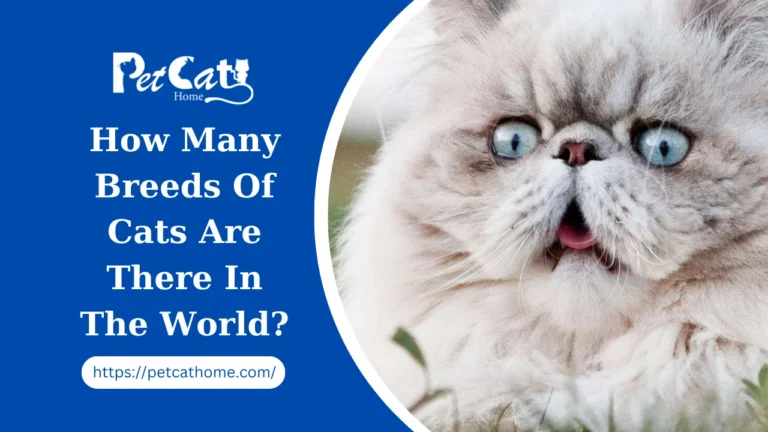What Does it Mean When Your Cat Licks You
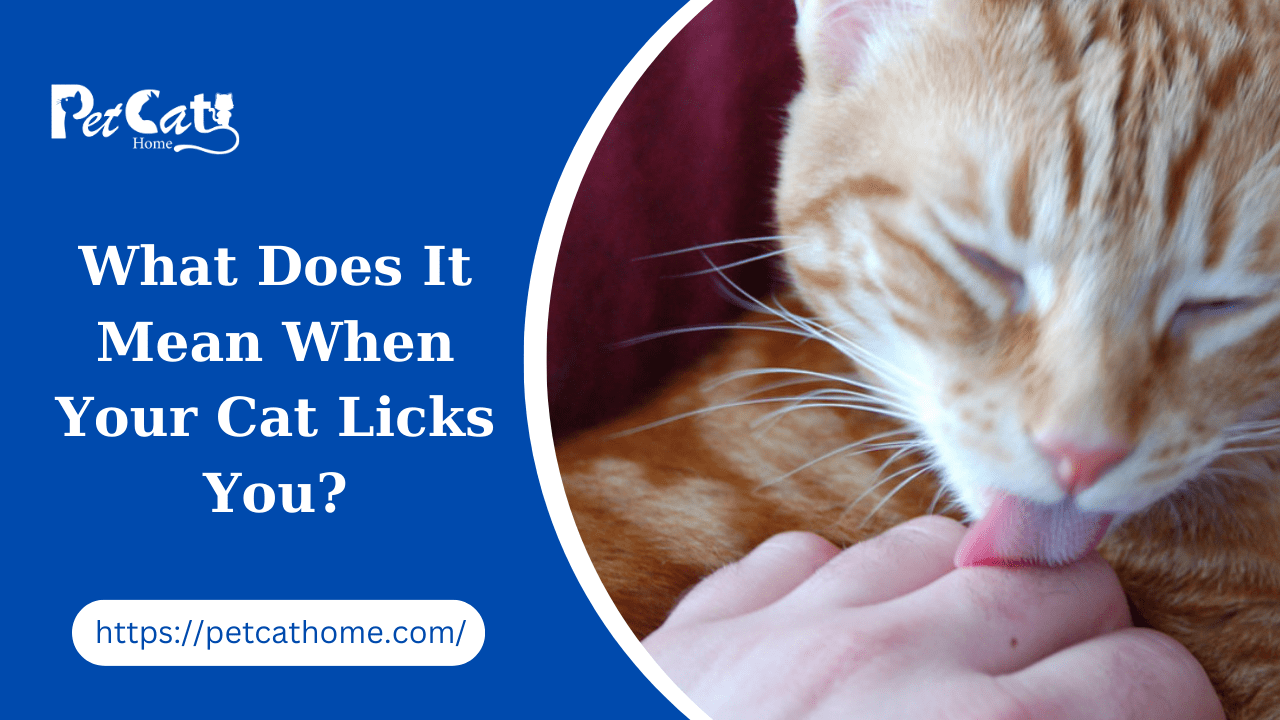
If you live with a cat, you have undoubtedly received the occasional lick from them. Because of that sharp tongue, it can feel a little strange initially, but we usually put up with it because it feels like getting kisses.
It can feel especially special because cats don’t always display affection as readily as dogs do. Is your cat kissing you when it licks you? Or could it have a different meaning? Continue reading to find out more.
Cats are enigmatic and fascinating animals renowned for being independent and loving. Licking is one of their many behaviors that frequently baffles and pleases cat owners. Has the question, “What does it mean when your cat licks you?” ever occurred to you? Let’s explore this endearing behavior and understand its meaning.
Quick Overview Cat Lick
Cat licking is a typical behavior that expresses communication, affection, and bonding. Cats use it as a means of showing their human friends that they care and that they trust them. Even though excessive licking is usually a good sign, monitoring your cat’s behavior is still important. You and your pet can develop a closer relationship by establishing limits and being aware of their cues.
Cats have rough tongues because their tongues are coated in unique barbs called papillae, which aid in removing dirt and debris from coats.
Cats lick people for various reasons, such as affection, scent marking, comforting or seeking attention, or occasionally due to anxiety or a medical issue.
Although letting your cat lick you is usually not an issue, you should always wash your hands after your cat has licked them because cats’ mouths can harbor dangerous bacteria.
Understanding Cat Lick Behavior
Before interpreting why a cat licks you, it’s vital to understand their behaviour fully. Cats speak through body language, looks, and actions, reflecting their primal nature, emotions, and needs.
Why Do Cats Lick?
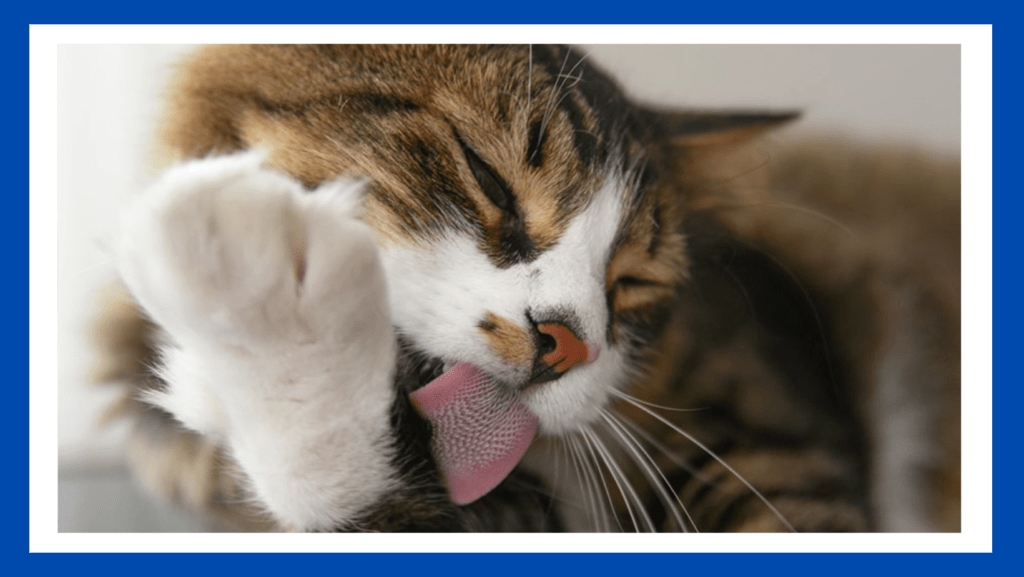
Instinctual Behavior
Cats lick because it’s an innate behaviour that comes from their upbringing. This is a habit that kittens who are cared for by their mothers acquire as a way to clean themselves and form bonds.
Social Bonding and Affection
Licking is a sign of affection and closeness for cats. It’s their method of showing love, comparable to a human hug or kiss.
Grooming and Hygiene
Beyond bonding on an emotional level, cats lick to stay clean. Their rough tongues aid in spreading natural oils, removing dirt, and maintaining the health of their coat.
Types of Cat Licks and Their Meanings
Interpreting what cats are trying to say requires understanding the subtleties of their licking. While gentle licks indicate comfort and affection, forceful licking may indicate stress or a health problem.
What Does Cat Lick Licking Signify About You?
Your cat licking you doesn’t seem to develop merely; it conveys messages for your relationship. It might suggest ownership and trust or even be associated with stressful behaviour.
How to Respond to Your Cat’s Licking
Reacting favourably to your cat’s licks strengthens the relationship. For an interaction to be harmonious, though, boundaries must be established, and discomfort signals must be acknowledged.
Medical Concerns Related to Excessive Licking
Although occasional licking is normal, excessive licking may indicate underlying medical conditions, allergies, or psychological stressors.
Is It Normal For My Cat Lick Me?
Licking is typical for cats because they are meticulous about maintaining their hygiene and grooming for much of their waking hours. It’s common for cats to lick their owners and other people, so it’s acceptable if your cat does the same to you.
A Bit About Cat Tongues
Unlike being licked by a dog, being licked by a pet cat doesn’t feel slobbery and wet. You have probably felt the filthy, sandpaper-like tongue of a cat licking you. A cat’s tongue has hundreds of minuscule barbs titled papillae, which give it its rough texture.
It makes sense that these papillae feel rough—keratin, the same substance that makes up a cat’s claws, is what makes them! When a cat grooms itself, the papillae are backward, which aids in removing foreign objects from the coat.
Why Is My Cat Licking Me?

There are probably a few reasons cats lick people, even though the exact cause is unknown.
A cat may lick its owner for a variety of reasons. It’s primarily a means of affectionate communication. Cats use licking to express love, trust, and bonding with their owners. It’s also a habit they picked up from their early life as kittens since their moms used to lick them to groom them. Therefore, if your cat licks you, it’s probably a sign of affection and intimacy.
1. Affection
One of the most likely causes of your cat licking you is affection. Your cat’s licking of you makes sense—mother cats lick their kittens, and bonded adult cats frequently lick each other, a behaviour known as allogrooming.
Your cat perceives you as a member of their social group even though you are not a cat because allogrooming is a way for cats to deepen their bond. Your cat is most likely enjoying your attention and fostering the strengthening of your bond if they start to lick you after you stroke them.
Your cat’s affectionate gestures are a sweet way to show how much they care. This could take many forms, such as licking, rubbing against you, or purring. It’s their way of showing you how much they care and how they connect with you; think of it like a human hug or kiss.
2. Attention-Seeking
Particular cats may lick people to attract their attention. Since cats are intelligent creatures, they will rapidly pick up the skill and repeat it if it has previously worked. If you give in to your cat’s licks by stroking or conversing with them, you have unintentionally taught them that licking is a reliable method of getting your attention.
Your cat is trying to communicate with you that it wants to be near you and interact. This behaviour can take many forms, such as licking, pawing, or meowing at you. Being social animals, cats want to interact and engage with their human companions. They frequently indicate that they need your presence and interaction when they seek attention.
3. Scent-Marking
In addition to grooming, cats lick other social group members to familiarize themselves with each other’s scent. When two cats lick each other, their saliva gets transferred onto their coats, leaving their scent behind.
Because cats have extremely sensitive noses, they can tell if a new cat is trustworthy or a social group member just by smelling it. Therefore, your cat may identify you as a family member by marking you with her scent when she licks you.
Cats have a natural behaviour known as scent-marking, marking their territory or demonstrating ownership using scent glands in their saliva. A cat will lick you to leave their scent on you, which may indicate that you are part of their territory or that they feel comfortable and owned by you. It’s a method for them to identify you as someone in their environment who they feel close to and trust.
4. Instinctive Behavior
From birth, mothers lick their cats, an innate display of affection. This may cause a higher frequency of licking behaviours in female cats than in males. To calm down when stressed, cats will occasionally lick other cats with whom they have a close bond.
Because cats can sense a lot about their owners’ emotions, you may notice that when you’re stressed or nervous, your cat treats you differently and licks you more.
Yes, exactly! When we talk about innate behaviour in cats, we talk about behaviours deeply embedded in their nature. They lick because it’s an instinctive behaviour, especially from their early days as kittens. Licking is a vital component of mothers’ grooming for their kittens. As they get older, this behaviour serves as a means for them to bond with their human companions, keep themselves clean, and show affection.
5. Comfort
Cats will occasionally lick themselves to self-soothe when they are nervous or feeling under the weather, in addition to doing so to calm another cat. If your cat constantly licks you and themselves, it may indicate they are stressed or not feeling well. Having your cat examined by a veterinarian is a good idea if you have any concerns.
Cats who require comfort may resort to self-soothing behaviours such as licking to find relief. Cats may lick as a form of self-comfort, like people may do calming exercises when they’re nervous or stressed.
Cats that lick their owners may also express a need for intimacy and comfort and a desire for security and assurance from their dependable human companions.
6. You Taste Nice
A cat may be drawn to your skin’s saltiness or scent if they lick you repeatedly or seem to linger afterwards. Because cats have such good senses of taste and smell, they might find it enjoyable to lick your skin or the taste of lotion or any residue left on it. Though this behaviour may be interpreted as an expression of affection, remember that it’s also a means for them to interact and explore their surroundings.
This is a fundamental explanation for the possibility of cat licking. They could just be licking you because they like the taste, primarily if you have recently handled their food or anything else tasty!
7. Weaned Too Early
A cat’s behaviour, including licking, can be impacted by being weaned prematurely, which means they were taken away from their mother and littermates before the recommended time. During the weaning phase, kittens pick up crucial social skills and behaviours from their mother and siblings, such as grooming and appropriate interaction.
Premature weaning can affect a cat’s comprehension of social norms and boundaries, resulting in excessive licking or other behavioural problems as the cat seeks comfort and attachment.
Sometimes, as they get older, kittens who are abandoned or weaned from their moms too soon turn to lick to get the comfort they were deprived of as babies.
These cats also frequently use their paws to “knead” their owners or soft items like blankets. Kittens naturally press their noses against their mothers’ teats during nursing to encourage the let-down of milk.
8. Medical Issue
If your cat licks itself excessively, there may be a medical issue. Skin irritations, allergies, or even psychological stressors can cause compulsive licking. Cats with skin conditions such as dermatitis or allergies to food or environmental factors may lick or groom certain areas excessively to relieve discomfort.
Additionally, increased licking as a coping mechanism may be a sign of behavioural problems, psychological stress, or anxiety. To rule out any possible medical concerns, it’s advisable to see a veterinarian if you notice your cat licking excessively.
Sometimes, a medical condition causes cats to lick you or objects excessively. If your cat is uncomfortable or feels queasy, they may lick more. Take your cat to the vet for a checkup if they haven’t been licking you for a while or if they are licking you excessively.
Is It OK To Let My Cat Licks Me?
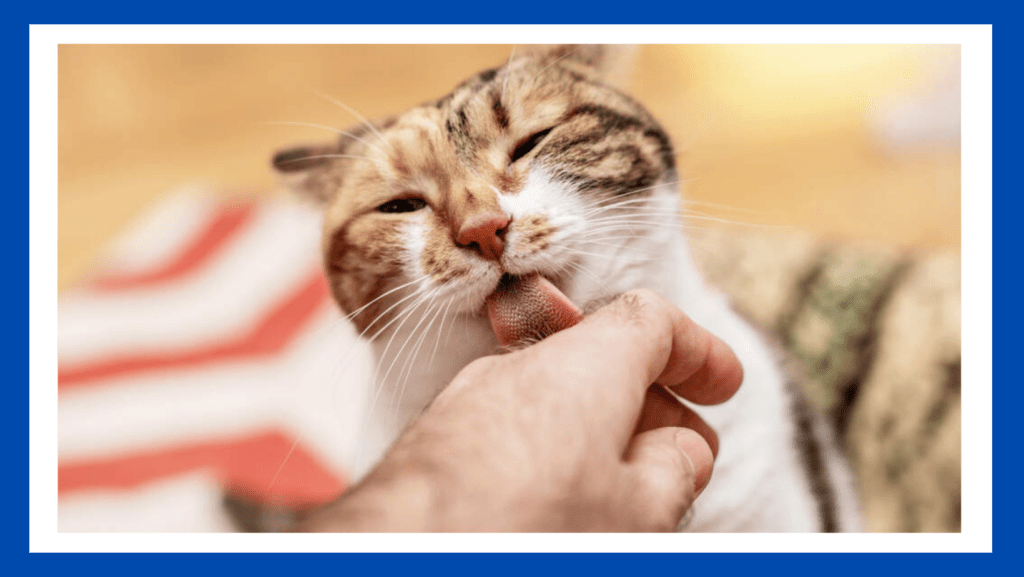
Let your cat lick you; it’s usually acceptable and shows that your cat trusts and loves you. But it’s crucial to establish limits and take individual preferences into account. Some may find it uncomfortable for hygiene or personal reasons when their cats lick them.
It’s usually acceptable to allow your cat to show you affection this way as long as you’re comfortable with it and there are no problems with them licking. Just wash your hands afterwards, mainly if your cat goes outside or you have any hygiene concerns.
Letting your cat lick you usually doesn’t cause any issues, but there are a few possible dangers to be mindful of. When a cat licks you, their saliva may carry pathogenic bacteria from their mouths that could infect you.
Allowing your cat to lick your face is not a good idea, and if your cat does lick your hands, wash them before eating or putting them in your mouth.
An infection could result from allowing your cat to lick an open wound. Even though it is exceptionally uncommon for cats to infect humans through licking, it’s wise to be cautious. People with weakened immune systems are more susceptible to illnesses and infections, so they should avoid letting their cats lick them.
Additionally, remember that some ointments or lotions you apply to your skin may poison your cat if they lick them off. If you are unsure, ask your veterinarian.
How Can I Stop My Cat From Licking Me?
Setting limits and gently redirecting your cat’s behaviour is essential to deterring excessive licking:
Redirect Attention: Use toys or treats to divert your cat’s attention when they start licking. This assists in diverting their attention from licking you.
Positive Reinforcement: Reward desirable behaviour. Reward your cat with treats when they interact with you without licking excessively.
Distraction Techniques: When they begin licking, use toys or playtime to divert their attention.
Set Boundaries: If the licking bothers you, step away quietly or gently redirect them without reprimanding them.
See a Vet: To rule out underlying medical conditions or anxiety, seek advice from a veterinarian if the excessive licking continues or is accompanied by other problematic behaviours.
When attempting, persistence, encouragement, and patience are essential.
You can try several strategies to break your cat’s tendency to lick you if you don’t want to be licked. Never yell at your cat or punish it for licking; doing so will make them fearful of you and anxious. If your cat is licking because it is anxious, this could exacerbate the issue. Here are some suggestions for you to try:
- If your cat licks you, stop petting them. You should not pet or converse with your cat if they lick you. Your cat should quickly come to the conclusion that licking as a means of attracting your attention is ineffective.
- Reward your cat with praise, treats, or more petting each time they interact with you without licking you.
- When interacting with your cat, consider covering your skin with a blanket or article of clothing.
- Give your cat lick-mats or puzzle feeders to satiate their licking urge.
- When your cat begins to lick you, try diverting their attention with a toy.
Consult your veterinarian, who can rule out any health issues if these suggestions don’t work or if your cat’s licking is serious.
Cat Lick: Final Thoughts
Cats frequently lick humans, and while there are other explanations, the most plausible one is that your cat is attempting to show you some love. But if your cat is licking excessively or causing you problems, get more assistance and guidance from a veterinarian.
Certainly! The complex behaviour of cat licking demonstrates communication, comfort-seeking, and affection. It’s a typical and charming feature of feline behaviour that shows their attachment to and trust in their human companions.
Even though excessive licking is usually a good sign, it can indicate deeper problems, so keeping an eye on your cat’s behaviour and establishing boundaries can help keep things in check. Because every cat is different, it’s essential to recognize their signs and react accordingly to build a closer relationship with your pet.
How to get a cat to stop licking you
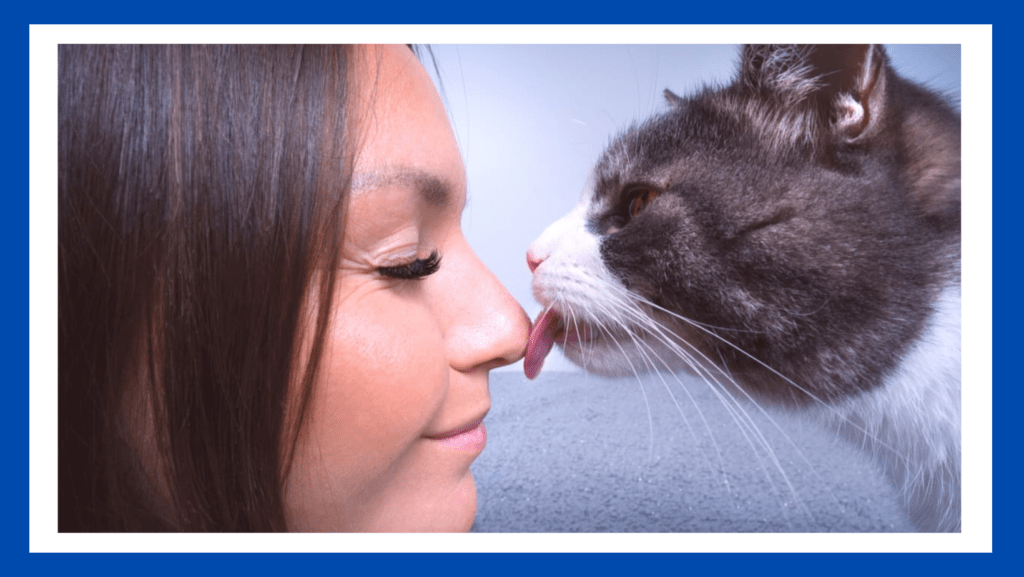
Sometimes, bacteria that cats carry in their mouths can spread to their body’s permeable membranes and open wounds. Cats should, therefore, only be permitted to lick intact skin; they should never be allowed inside the nose or close to the mouth, especially in compromised immune systems.
There are ways to stop your cat from licking if you’re concerned about infectious diseases, your cat has a tongue that is too sharp, or you don’t like to be licked. When your cat’s licking starts to bother you, try these steps:
- When your cat starts licking you, ignore it and reward them when they do other things, such as calling, pawing, headbutting, or any other behaviour they usually do to get attention.
- Until your cat loses interest, keep your skin covered with a towel or long sleeves.
- When your cat starts to lick you, get up and move away.
- Ensure that cats have a variety of toys to keep them entertained in their surroundings. Change up the toys your cat has access to to ensure they are always engaged.
- To keep your cat happy, give them enough attention. Set aside time each day for you to play and communicate in peace.
Why do cat licks other cats and pets?
In their social hierarchies, grooming plays a significant role in the bond-building process for cats. Some cats groom themselves and others by licking them to share the benefits of grooming. To help with grooming, mother cats frequently lick their kittens and other loved ones.
A single cat is often designated as the group’s “master groomer” due to the social dynamics in multi-cat or multi-pet households. The allo-groomer is another name for this master groomer. Cats that have earned this title assume duty for maintaining the group’s coats.
Within the social structure, bonds are also formed by licking between dogs and cats. Licking is a social behaviour that expresses acceptance, tolerance, and confidence. Cats express these same ideas in different and original ways. For instance, some of the same feelings toward cats are symbolized by headbutting or rubbing the tops of their heads against their humans’ faces.
Like their human companions, cats lick other cats and pets for various reasons. The following are some explanations for this behaviour:
Licking is one way that cats form social bonds with one another. Licking each other is a sign of affection and a means of enhancing the social bond between cats.
Grooming: As a grooming behaviour, cats groom one another. It purges dirt and parasites from their fur, keeping them cleaner.
Licking also contributes to establishing territorial boundaries and hierarchies among a group of cats. In their social hierarchy, licking another cat can indicate dominance or superiority.
Cats can comfort one another through licking, particularly in stressful situations. Cats grooming each other more often are less stressed and anxious.
Comprehending the motivations behind this conduct can illuminate the social dynamics and connections among cats and other household pets.
Do cat licks mean kisses?
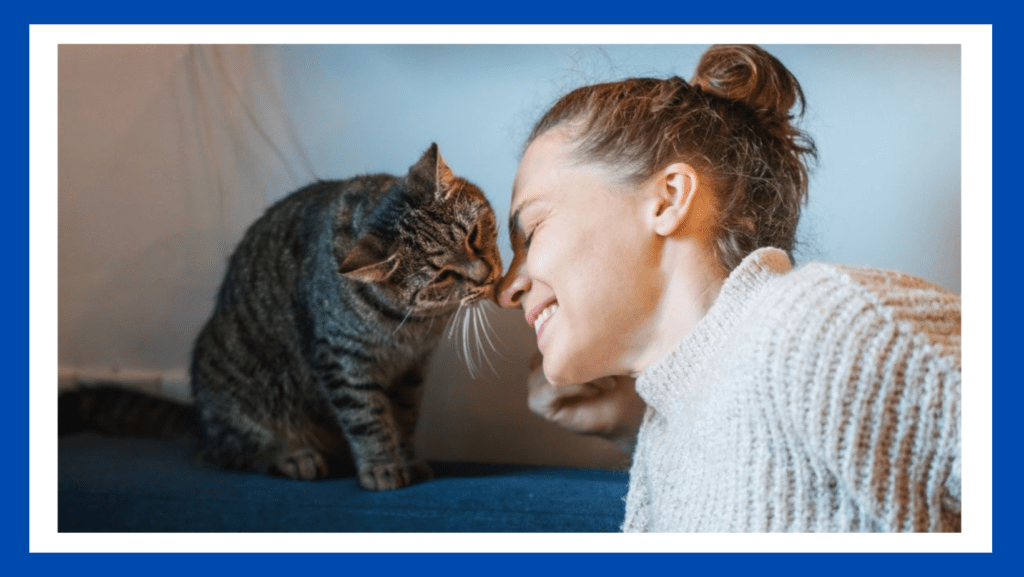
Cat licks and human kisses are not the same, even though they can look similar. Cats can only express their affection and communication through cat licks. It’s more about bonding, grooming, and expressing affection within their social dynamics when a cat licks you or another pet.
Although the physical action of a cat’s lick may be similar to that of a kiss, the purpose is distinct from what humans consider a kiss. But licking is a sign of affection and trust cats give their friends.
Cats use licking as a primary means of communication in their social structures. It serves as a means of emotional communication, relationship building, and physical well-being maintenance.
Cat licks are more than just a grooming tool; they are a way for cats to communicate feelings of love, trust, and friendship. They form relationships with nearby humans and other pets using harsh tongues for self-cleansing and bonding.
Their early interactions with their mothers and littermates have left this behaviour firmly embedded in their instincts. It’s a learned behaviour that persists into adulthood and reflects their desire for intimacy and social interaction.
Comprehending this distinct mode of communication improves our understanding of feline behaviour and fortifies the relationship between cats and their humans or other household pets.
Maybe Useful
FAQs
u003cstrongu003eWhy does my cat lick and then bite me?u003c/strongu003e
Cats may playfully lick their fingers before giving them a light bite. This behaviour frequently resembles how they play with their littermates. Usually harmless, it’s just a way for them to act playfully. But, it’s best to refocus their behaviour and establish boundaries if the biting gets too severe or violent.
u003cstrongu003eIs it safe if my cat licks my face?u003c/strongu003e
Your cat can safely lick your face in general. They have some cleansing properties to the enzymes in their saliva. But you must exercise caution, mainly if your cat has been outside or you have allergies, as their saliva may contain parasites or bacteria.
u003cstrongu003eHow do I stop my cat from excessively licking?u003c/strongu003e
When they lick excessively, try diverting their attention with toys or treats. Set boundaries and give positive reinforcement for appropriate behaviour. If something starts to bother you, gently step away. Seeing a veterinarian can help rule out any underlying medical conditions or behavioural problems if the behaviour continues.
u003cstrongu003eCan a cat’s licking behaviour change over time?u003c/strongu003e
Indeed, a cat’s licking habits can alter. Cats’ behaviour may change as they get older or their surroundings change. Their licking habits may change due to stress, new friends, or health problems.
u003cstrongu003eShould I be worried if my cat suddenly stops licking me?u003c/strongu003e
An underlying problem may be indicated by an abrupt change in behaviour, such as a cat quitting its regular licking routine. Even though there may not always be an urgent reason to be concerned, keep an eye on their general behaviour and see a veterinarian if the change continues or if there are any other alarming symptoms.
Conclusion
Finally, understanding your cat’s licking habits will open your eyes to a world of affection, communication, and social dynamics in the feline domain. Their licks convey various messages, from bonding and grooming to building relationships and expressing emotions like trust and affection.
Even though licking a cat is usually a good thing, it’s essential to recognize its subtleties. It’s a special kind of communication rooted in their ancestry and instincts. Understanding the causes of this behaviour facilitates a closer bond between you and your animal friend.
A happy relationship is facilitated by establishing boundaries, correcting behaviour, and checking for modifications in their licking routines. Recall that every cat is unique and that various factors, such as age, environment, or health, may cause a cat’s behaviour to change over time.

